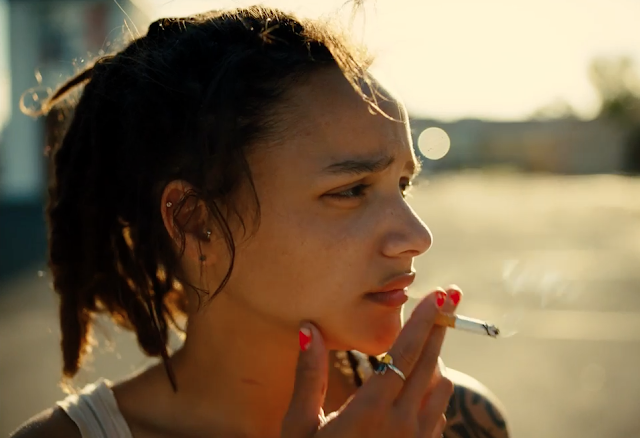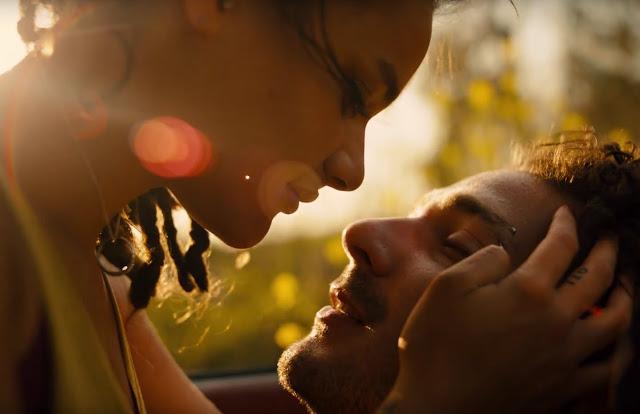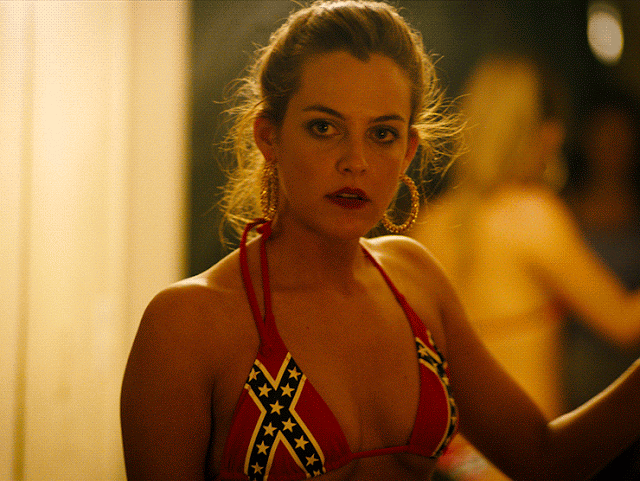A scraggly valentine to the majesty and misery of the pursuit of happiness, American Honey is a sprawling, glorious mess of a movie, one that both gladdens and maddens. The first stateside film from the British director Andrea Arnold, it is nothing less than a grand statement on the quixotic fragility of the American dream, even if it is also a quiet, poignant character study. This duality—ambition fused with intimacy—is tough to pull off, and on occasion here, the panoramic threatens to overwhelm the personal. But the pluck of American Honey cannot be denied, and neither can its heroine, a wellspring of defiance and heartbreak who is fittingly named Star.
Played in a searing debut performance by Sasha Lane, Star is an 18-year-old living in an Oklahoma backwater; when we first see her, she’s rummaging through a dumpster, searching for food. She’s down on her luck, no question, but there’s a calming matter-of-factness to the image, and both Arnold and Lane ensure that Star doesn’t come across as yet another wretched lass in need of salvation. Still, things could certainly be better, as we learn during a swift and economical prologue. Arnold has never been one for hand-holding—she plops you down with her protagonists and lets you uncover their mysteries for yourself—and American Honey is gratifyingly devoid of exposition. All it takes is a quick, mostly silent scene in Star’s modest apartment—where her boyfriend is handsy and a Confederate flag adorns one wall—and it’s clear that she wants to break free from the shackles of her routine. So it’s hard to blame her when she lugs her young half-siblings to a bar, dumps them with their mother, and sprints off into the hot southern night.
Where is she running to? You can supply your own metaphor, but the literal answer is Jake (Shia LaBeouf, very good), a gregarious charmer whom Star met cute earlier that day at a grocery store, where he serenaded her while tiptoeing across a checkout line’s conveyor belt. A cross between Jack Kerouac and Don Draper, Jake is the leader of a ragtag group of bohemian delinquents who travel by van, selling magazine subscriptions door-to-door. And American Honey, distilled to its essence, is a road movie. As befits the genre, it follows Star as she traverses Middle America (moving from South to North), meeting new people, facing new challenges, learning new lessons, and ultimately gaining a greater appreciation of who she is.
This amounts to both more and less than it sounds. There’s tremendous heart in Arnold’s filmmaking—one of her earlier features, Fish Tank (with a chillingly predatory Michael Fassbender), was a devastating coming-of-age story about an aimless teenager just a few years younger than Star—but also quite a bit of formal sloppiness and narrative bloat. A disciple of Dogme 95, she shoots everything handheld (as always, her cinematographer here is Robbie Ryan), resulting in herky-jerky camerawork that is initially distracting, though you learn to ignore it soon enough.
More frustrating is Arnold’s refusal to define her supporting characters as anything more than vaguely sketched symbols of youthful disenchantment. American Honey runs long (roughly 160 minutes), which feels right for a movie devoted to exploring the vastness of American life; those endless highways can easily resemble Star’s uncertain future stretched out in front of her, and it’s going to take time before she knows where she’s headed. But Arnold includes far too many listless scenes of Star simply riding in the van with her newfound coworkers, none of whom possesses any real shading or personality. (The only one who makes a remote impression is Pagan, a Darth Vader obsessive played by Arielle Holmes, star of last year’s critically acclaimed Heaven Knows What.) It’s a choice that may make intellectual sense—a career on the road is invariably spent cramped in uncomfortably hot cars, where nothing really happens—but Arnold’s approach is overly slack, relying on Lane’s magnetic screen presence and a hip soundtrack to do her work for her.
But whenever Star tumbles out of that van, American Honey flares to bracing, crackling life. The movie’s strongest thread is the simmering, circling courtship between Star and Jake, two people with intense chemistry who can also drive one another crazy. Rather than framing the film as a straightforward love story, Arnold brilliantly contextualizes Star and Jake’s feverish romance within the banality of their work; some of the movie’s most giddily unpredictable scenes involve little more than Jake knocking on doors, attempting to woo customers, while Star looks on sullenly and occasionally bursts into sudden, figurative flame.
It’s a thrilling study in complementary contrasts, one sharpened by a pair of splendid performances. LaBeouf’s eccentric off-screen behavior has rendered him more meme than actor, but on screen he has shown repeatedly—in Disturbia, in Fury, even at times in Transformers—that he can be indecently charismatic, and here he somehow makes Jake, with his antic movements and ludicrous braid, a twitchily dashing figure. But Lane is the real story. She’s in every scene in the film, and she powerfully evokes Star’s restless yearning, even as she masks it with a façade of tempestuous volatility.
American Honey could have played perfectly well as an impassioned tale of a push-pull love affair—it certainly would have been more taut and focused—but Arnold is interested in something different. She wants to explore the culture of these so-called flyover states, and so she often sends Star out on her own, letting her mingle with different classes of economic prosperity and social squalor. At times, American Honey feels like a slow-burn horror movie; with her vulnerability and naïveté, Star seems destined to be exploited, and she often finds herself alone with men who are far older and stronger than she is. Yet while Arnold can be unsparing in her vision of a land ravaged by poverty and drug abuse—in one quietly heartrending sequence, Star arrives at the home of a zonked-out mother and bonds with her three adorable, plainly neglected children—she is uncommonly generous in her depiction of working-class souls as warm, thoughtful people with their own hopes and dreams.
In fact, the scariest person whom Star meets isn’t the truck driver who takes her for a quick ride, or the oil driller who admires her neon-green dress, or any of the potential customers she peddles magazines to—it’s Krystal (Riley Keough, from The Girlfriend Experience), the manager of Jake’s ragged band of hucksters. Jake may be a virtuoso salesman, but Krystal, often glimpsed in a Confederate flag bikini, is the one who’s really in charge, creating schedules, setting rates, and, when she deems it necessary, meting out punishment. She also appears to be Jake’s part-time lover, even if she is in every way his opposite; where Jake is flamboyant, cavalier, and amiable, Krystal is acidic, calculating, and cruel.
She is, in other words, the boss. And that’s yet another surprising facet of American Honey: Even as its characters embrace the spirit of liberation, they find themselves ensnared within the ubiquity of corporate bureaucracy. Krystal is the crew’s CEO, concerned only about maximizing revenue, and flicking just enough crumbs to her sales force to keep them in line. Jake has talent, but he’s mere middle management with no upward mobility, recruiting new associates before feeding them to the wolves. And Star, as the new employee, must navigate a minefield of odd rituals and quirky team-building cheers. She joins up with Jake because she’s seduced by the promise of a better, more exotic life, but at the end of the day, she still needs to hit her quota.
It’s a lot to process, for Star and for you. American Honey is so stuffed with material and ideas, it can feel overwhelming, even if it is also sometimes boring. (That said, it is far more enjoyable than Arnold’s prior feature, her uneven and unpleasant adaptation of Wuthering Heights.) But the film’s sporadic overreaching is of a piece with its sweeping scope, and in smuggling its broader social commentary within Star’s narrower journey of self-discovery, it achieves a gentle grandeur. This movie is a megaphone, and if Arnold may be saying more than she needs to, it’s all relative. When she fixes her camera on Lane—her face full of hunger, her eyes flashing fire—she doesn’t need to say anything at all.
Jeremy Beck is the editor-in-chief of MovieManifesto. He watches more movies and television than he probably should.





A great review Jeremy, but you missed one crucial point. It isn't her boyfriend who is 'handsy' in the prologue – it's her FATHER!
Hmm, not sure. Did some Googling, and the consensus appears to be that he's definitely the father of her half-siblings, but he isn't necessarily Star's father. Of course, it's super-creepy regardless.